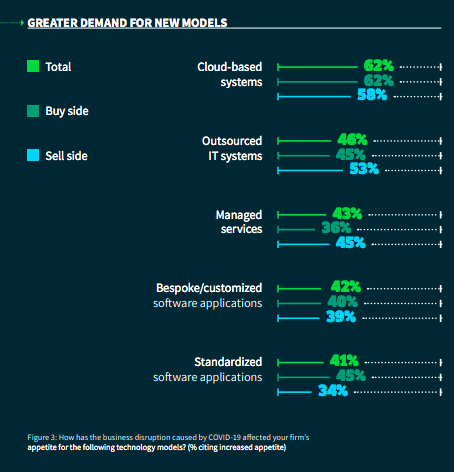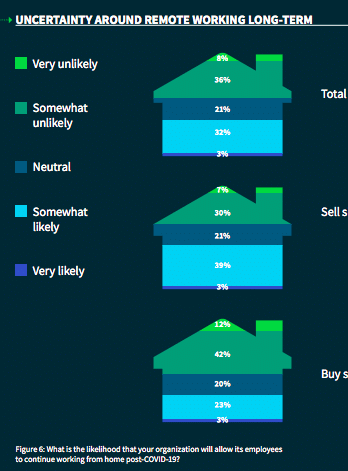When Covid-19 was pronounced as a pandemic FIS, the financial services technology provider, had 700 guests attending two events and had to get them back home immediately. Ellyn Raftery, chief marketing and communications officer, and the executive team had to devise a strategy for communicating with clients and also the firm’s employees around the globe.
Raftery told Markets Media that Gary Norcross, chairman, president and chief executive, communicated on a weekly basis including by video from his home and through letters.

“Transparency was very important as our employees’ personal lives were changing dramatically so we sought to be a source of truth for them with updates from the company with consideration for local government requirements and a global view,” she added.
FIS has held table-top exercises on a regular basis, run drills and devised playbooks for potential business interruptions as the firm provides critical infrastructure to financial services.
“We had tested shifting systems between locations such as India, Manila and Milwaukee,” Raftery added. “Our performance was remarkable despite trading volumes increasing nearly fivefold.”
For example, she described FIS making an ‘extraordinary effort’ in India to get critical employees into the office to operate secure systems. The employees had to be cleared by the Indian government and FIS had to liaise with hotels and restaurants to arrange food and housing despite the lockdown.
One result of the pandemic has been the rise in remote working, which has led to increased demand for technology. For example, FIS’ own employees can work from home until the first quarter of next year.
Raftery said: “There has been a massive uptick from large institutions for outsourcing solutions going forward so we are helping clients implement the technology they need to move to the next generation environment including increasing automation.”
FIS carried out a global survey of 250 capital markets executives in June and found that the majority, 62%, said the disruption from Covid-19 has increased their appetite for cloud systems.
Half of the respondents, 52%, said they were prioritizing cybersecurity tools and 49% upgrades to trading systems, while only 40% were prioritizing client-facing systems.
Tony Warren, head of strategy at FIS Capital Markets, said in the report “We are seeing sustained demand for accelerating managed services, including business process as a service (BPaaS) and cloud deployments, reflecting the industry need for greater resilience, scalability and performance assurances going forward.”

Warren continued in a blog this month that firms are turning to virtual and remote data delivery.
“By leveraging SaaS environments, the distribution of data becomes virtual rather than actual and eliminates the risk of a centralized workforce,” wrote Warren.
He added that with most employees still working from home, firms need a bigger commitment to compliance and risk.
“So, it’s not surprising to see that 46% of respondents are more interested in leveraging cloud-based solutions in this area, and 43% will prioritize investment and modernization around regtech in the next 12 months,” Warren said.
The survey also found that 26% of buy-side firms plan to let employees continue working from home after Covid-19, while this was higher for sell-side firms at 42%.

Career route
Raftery joined FIS in 2012 from CA Technologies, the enterprise information technology software and service company, where she had been senior vice president of marketing. Prior to CA Technologies, Raftery had been chief marketing officer of Unisys and vice president of global strategic marketing at MarchFIRST.
“FIS is a high integrity company with a dynamic leadership that is focussed on client needs so it was also a great cultural fit for me,” said Raftery.
She continued that in the last eight years marketing has transformed from events and communication only into a full scale marketing organization including strategy and business intelligence, research, thought leadership and more – including a demand generation center that uses artificial intelligence.
“In my role I am also responsible for commercialisation of solutions and bringing forward the voice of customer,” Raftery added. “There is an art and science of marketing. There is a narrow view that the function is just about how things look and feel.”
She explained there is a a strategic opportunity in the role such as during the pandemic where marketing defined the voice of the company to the market and employees, helping to create and cultivate the culture.
Diversity
Raftery said it is hard for women to survive at the top level given the male-dominated nature of finance and technology.
“The fast-paced environment combined with personal responsibilities like being a mother too, makes trade-offs choices complicated,” she added. “You need a strong partner who supports your profession and the family.”
Today we celebrate Women’s Equality Day. We need to continue to push for change. By empowering ourselves to speak out, have our voices heard and owning our own abilities, collectively we will change the landscape of the future. #womensequalityday2020
— Ellyn Raftery (@ellynraftery1) August 26, 2020
She continued that FIS is focused on continuing to drive a diverse environment and recruiting more diverse candidates. The firm has programs such as unconscious bias training and is also reviewing it’s university scholarship programs and ensuring more scholarships go to black universities.
“Our chief executive has done a good job at appointing multiple women to the board and executive team,” she said.
Raftery’s advice to women is to own your destiny, make sure you always have a voice, to not be afraid to challenge and put ideas on the table and to never let someone block you.
“If you always act with high integrity and have the best interest of the company at heart then you will never do the wrong thing,” she said.
On a personal level Raftery would like to return to her art and is hoping that travel comes back.
She concluded: “On a professional level I am on a journey to expand the role and voice of marketing to evolve our strategic role as a part of commercialisation and innovation.”
